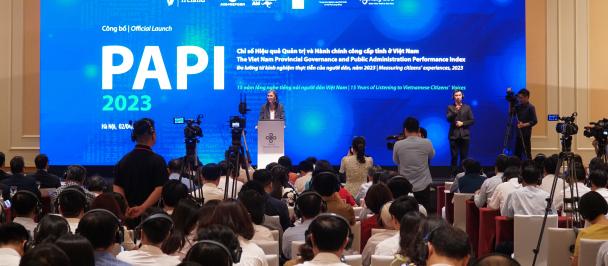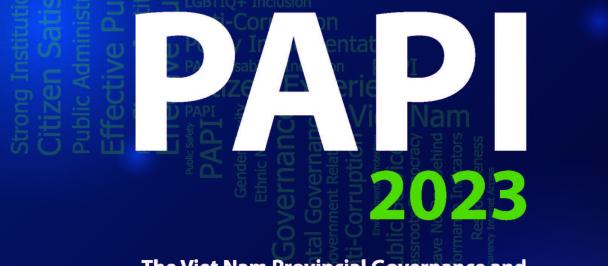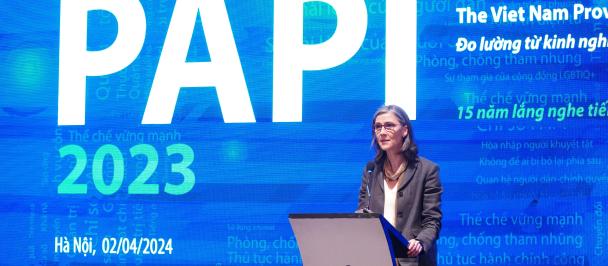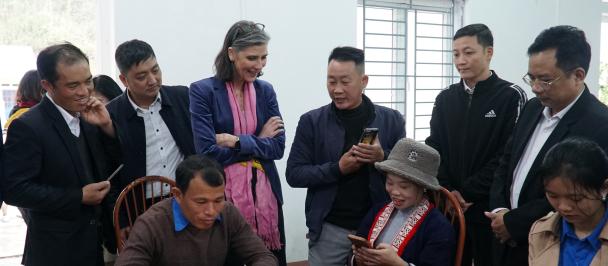Poverty, Economic growth, Jobs, Road quality, and Corruption top concerns of Vietnamese citizens: 2022 PAPI
April 11, 2023
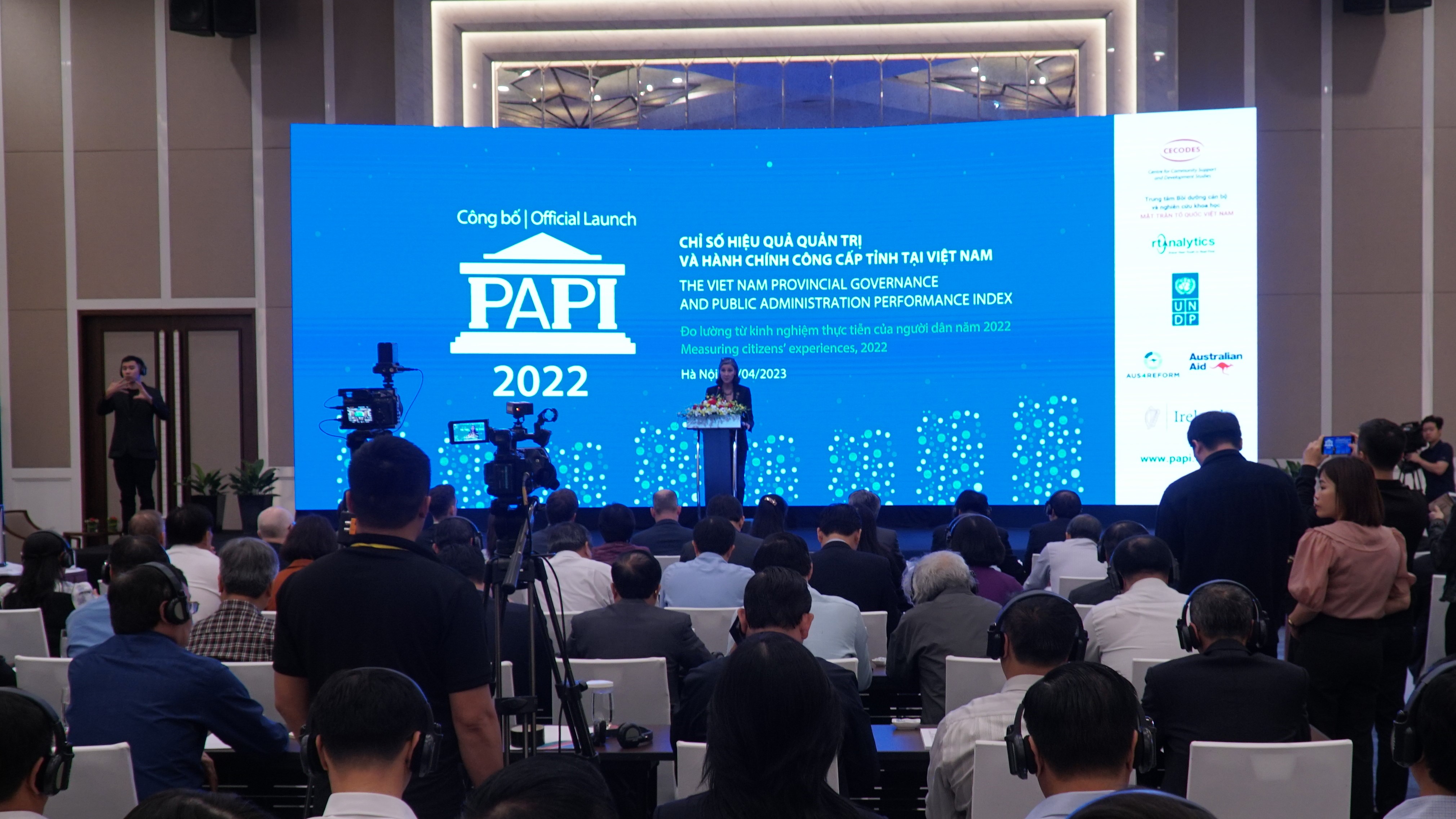
Pandemic recovery contrasts with visible scarring amid high expectations for effective governance – elevated by evolving public sentiment in the fight against corruption
Ha Noi, 12 April 2023 – Headlined by a rebound in citizens’ economic optimism that contrasts with still visible scarring from the COVID-19 pandemic, the 2022 Provincial Governance and Public Administration Performance Index (PAPI) Report, released today, also provides an important temperate check on government performance two years into its term and reveals changing public sentiment in the fight against corruption amid high expectations of effective governance that meets people’s evolving aspirations.
Viet Nam’s efforts to overcome the socio-economic impacts of the unprecedented health crisis in 2022 translated into increased economic confidence at household and national levels. In a notable turnaround, 66.1 percent of respondents viewed the national economy as “good” in 2022 – a 19.4 percent leap from a year earlier, while there was a 13.7 percent drop in citizens assessing conditions as “bad” from 19.8 percent in 2021 to only 6.1 percent in 2022. Similarly, at the household level, fewer citizens reported their economic situation was “poor” (11.4 versus 15.3 percent in 2021).
Despite this progress, some scarring from the health crisis was evident. While 56 percent of respondents confirmed their economic conditions were better in 2022 than a year earlier (52 percent), aside from 2021, this percentage in 2022 was still the lowest since 2012. Similarly, those suggesting that their economic conditions were worse rose to their highest levels since 2012, except for 2021. These results underline that many respondents are still feeling the lingering pain of the economic damage by the pandemic, with ethnic minorities and women most acutely impacted given the higher prevalence of poverty and vulnerable employment among them.
The transition to the post-pandemic era is also reflected in health and health insurance as 2021’s issue of greatest concern plummeting from 23.84 to 6.38 percent to be overtaken by poverty/hunger (22.13 percent) – perennially at the top of the list since 2015, aside from pandemic-hit 2021.
With a record 16,117 respondents randomly selected from all of Viet Nam’s 63 provinces, PAPI is in a unique position to deliver invaluable insights into government performance at all levels two years into its 2021-2026 term and actualize the 2023 legislative agenda.
“Over the past 14 years, the PAPI research program has had a positive impact, transforming the awareness and actions of provincial governments. It has practically contributed to public administration reforms - a key content of three strategic breakthroughs in socio-economic development that the Party and State of Viet Nam have been making efforts to implement,” said Dr. Nguyễn Hữu Dũng, Vice President of the Viet Nam Fatherland Front Central Committee. “Therefore, the research and analysis of citizens’ assessment of the provincial governance and public administration performance provide important indicators that help policy makers timely adjust policies and innovate operating methods to meet reality’s requirements”.
“I am pleased to see the Government of Viet Nam has embraced PAPI to strengthen policy and the delivery of public services, especially at the provincial level,” said Australian Ambassador to Viet Nam Mr. Andrew Goledzinowski. “Importantly, PAPI presents the views of a range of voices including women and men, and people with disability. Hearing these views is critical for improving government services. Australia has supported this important governance initiative for seven years as we recognize the value of the work to Viet Nam”.
With the scaling up of the nationwide anti-corruption campaign a signature feature of this government term, PAPI in 2022 reveals changing public attitudes to this issue with a 4.8 percent rise in citizens expressing a greater level of concern with corruption in 2022 from a year earlier. This trend is consistent with PAPI’s findings in Dimension 4 ‘Control of Corruption in the Public Sector’, with the first publicly perceived downturn in government performance in tackling corruption since 2016. Drivers behind this trend include increased concern about nepotism in State employment and corruption in land registration.
With transparency a critical factor to reduce corruption by exposing potential malfeasance, little progress was also evident in the dimension Transparency in Local Decision-making. This was primarily the result of citizens’ concern about the accuracy of household poverty lists developed by grassroots authorities to allocate State resources. Nonetheless, some improvements in the transparency of commune budgets and expenditure were evident.
To support the government’s 2023 legislative agenda, PAPI in 2022 also included key indicators to inform policy discussions and track implementation of two key legal documents: amendments to the 2013 Land Law and the new Law on Grassroots Democracy Implementation.
“PAPI’s mission is to monitor the Government’s implementation of development and policy agendas, thus contributing to enhanced responsiveness, transparency, and accountability of public institutions,” said UNDP Resident Representative in Viet Nam Ms. Ramla Khalidi. “This 2022 PAPI Report provides a source of reliable evidence-based data for central and local authorities to review their performance in the key areas of governance, public administration and public service delivery.” (Read full speech)
With the 2013 Land Law – the overarching legal document that regulates land transactions, acquisitions, seizures and compensation – PAPI explored citizens' perceptions and experiences with local land governance and whether current regulations provide a level playing field. A key headline is farmland seizures increased in 2022 as reported by 4.1 percent of respondents. In localities where at least 30 percent of residents work in agriculture, 6.5 percent reported having farmland seized in 2022 – up from 5.4 percent in 2021. This points to seizures of farmland in rural areas remaining a salient issue which should be addressed by stronger regulations in the Land Law on transparency and equal access to land information.
With perceived low levels of compensation offered by authorities to citizens a common source of friction underpinning land seizures, a special PAPI question in 2022 revealed a divergence in respondents’ estimates of the market and official prices of land in their locality. This suggests that local governments are perceived not to take market rates into account when setting land seizure compensation. These findings suggest more frequent changes in official prices, rather than every four years, to keep up with rapidly changing market prices – particularly in urban areas. The survey also points to citizens’ low awareness of land prices, with up to 70 percent of respondents unable to estimate a market or official land price. This could be a result of citizens’ limited awareness and engagement in local land use planning.
Similarly, with introduction of the Law on Grassroots Democracy Implementation in 2023 replacing the 2007 Ordinance on Grassroots Democracy Implementation at the Commune Level, PAPI in 2022 helped establish several important baselines for monitoring this “people-centered” law to ensure that elected officials reflect the rich social fabric of Vietnamese society. It found that respondents as voters were more supportive of ethnic minority candidates (85 percent), than those who are Lesbian, Gay, Bisexual, Trans, Intersex and Queer (LGBTIQ+) (45 percent) and persons with disabilities (PwD) (32 percent) across elected positions from central to grassroots levels. However, there are reasons for optimism, as the solid foundation of voters willing to vote for LGBTIQ+ and PwD will likely grow further with the introduction of inclusive election policies, as is the case for women in politics.
“The Embassy of Ireland greatly values PAPI’s prioritisation of inclusivity for marginalised groups. Ireland is committed to reaching those furthest behind and we welcome PAPI’s focus on ethnic minorities, women and girls, persons with disabilities, and now the LGBTI+ community. We are delighted to commit increased funding for these efforts in 2023,” said Mr. Conor Finn, Deputy Head of Mission, the Embassy of Ireland in Viet Nam.
Grassroots democracy was further explored amid the full mobilization of the election apparatus and voting for village heads in all 63 provinces in 2022. It revealed an apparent waning in competitiveness of village head elections according to PAPI data over time, with less than half (48 percent) of respondents reporting their village elections had more than one candidate to vote for. Probing further, PAPI data suggests a key reason is the diminishing importance of village heads over time resulting in fewer candidates wanting to compete for the job, with less of a role in mobilizing additional resources for public works.
Turning to e-governance and digital transformation, there remains significant scope to increase the take-up of e-services by segments of the population, despite citizens’ increasing access to the internet. In 2022, fewer respondents completed government certification or land use rights certificate procedures online than in 2021, while less than 5 percent have ever visited the National E-service Portal and only 3 percent have set up an account.
Finally, this report reviews provincial progress across the eight PAPI dimensions - Participation at Local Levels, Transparency in Local Decision-making, Vertical Accountability, Control of Corruption in the Public Sector, Public Administrative Procedures, Public Service Delivery, Environmental Governance, and E-Government.
Six of the top performers are each found in the Red River Delta and in the Northcentral and Central Coastal regions, and the 14 poorest performers are in the Central Highlands, Mekong River Delta, Northern Mid-land, and Mountainous regions. Interestingly, the gap between the lowest and the highest possible provincial scores was narrower than in 2021, meaning many provinces did not raise the bar on their 2021 performances. Compared to 2021’s findings, 33 provinces did significantly better in Participation at the Local Levels, 18 in Transparency in Local Decision-making, and 30 in E-Governance. However, 29 provinces performed significantly worse in Environmental Governance, 18 in Control of Corruption in the Public Sector, and 18 in Public Service Delivery, respectively.

 Locations
Locations
